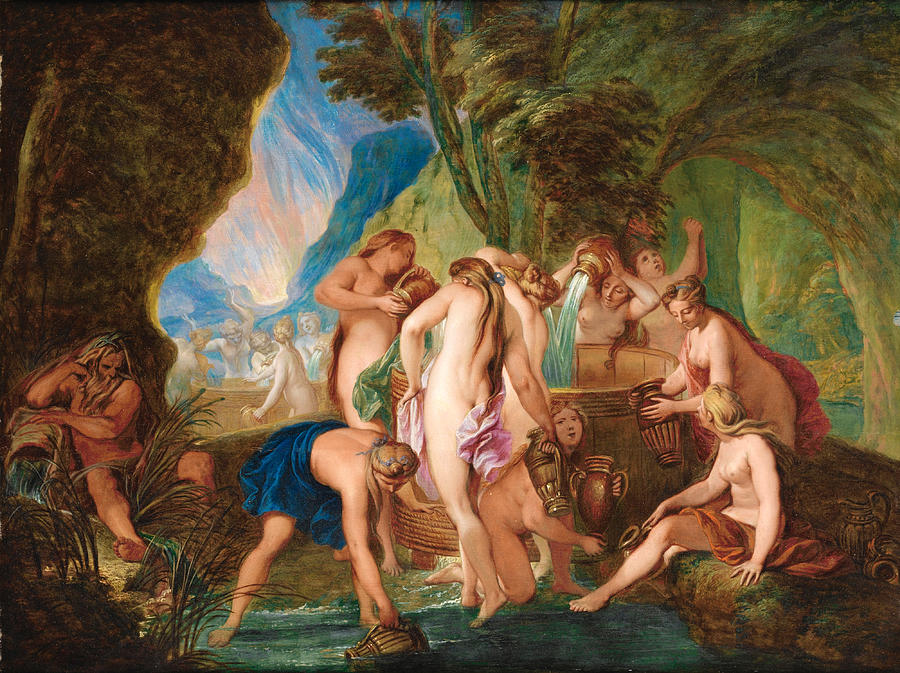In the grand tapestry of Greek mythology, where gods and mortals intermingle, the House of Atreus stands out as a macabre masterpiece. The Greeks, with their mortal struggles mirroring our own, were not only burdened by the trials of existence but also entangled in the capricious whims of the Olympic gods. These divine entities, with their godly powers and unpredictable temperaments, wove a complex web of fate for those unfortunate enough to fall under their gaze.
The House of Atreus, a once-proud lineage, found itself ensnared in a curse that transcended generations. The gods, weaving threads of jealousy, betrayal, and vengeance, crafted a narrative that unfolded with the inevitability of fate itself. From the sacrilege of Tantalus to the grim aftermath of Agamemnon’s sacrifice of his daughter Iphigenia, the curse manifested in a series of tragic events that stained the bloodline.
As the House of Atreus navigated the treacherous waters of divine retribution and mortal folly, the curse unfolded like a dark opera, each act more haunting than the last. The interplay of mortal choices and divine interference created a narrative that echoed through the ages, leaving an enduring legacy of sorrow and cautionary tales.
The Curse of the House of Atreus, with its intricate twists and turns, serves as a timeless reminder of the delicate balance between mortal agency and divine intervention. In the vast pantheon of Greek mythology, this curse emerges as a cautionary tale, urging us to ponder the consequences of our actions and the inescapable reach of fate, even in the shadow of the gods.

For example, Zeus cursed one family for six generations, and other well-known gods took part in this action. The curse did not cease until the family line died out.
The saga is called the Curse of the House of Atreus. It is so outrageous that it has been told since its onset, featured as a favorite topic in ancient Greek theater, and it even made it to Broadway in 1968.
The sordid tale
The ominous tale did not commence with Atreus, but by the time his life unfurled, the looming specter of the curse had become unmistakable. Its roots were tangled in the deeds of Pelops, scion of Tantalus, who himself bore the divine lineage of Zeus.
In a bid for matrimonial bliss, Pelops orchestrated a sinister gambit. His target was the daughter of a king, and he wove a tapestry of deceit that culminated in the violent demise of the unsuspecting monarch. Aided by a conspiring servant who craved a night with the bride as his reward, Pelops’ treachery bore bitter fruit.
Yet, as the machinations played out and the king lay lifeless, Pelops, driven by a newfound callousness, reneged on his promise to the servant. In a cruel twist, he commanded the execution of the very man who had facilitated his ascent to the throne. Faced with imminent death, the betrayed servant cast forth a damning curse, an imprecation that echoed through time and lineage.
The curse, like a malevolent tide, surged backward, enveloping Pelops’ own father, Tantalus, in its dark embrace. Tantalus, a figure whose actions had invited the wrath of gods before, found himself ensnared once again, this time by the vengeful words of a dying servant. The tendrils of the curse slithered through the corridors of destiny, entwining the House of Atreus in a legacy of doom that would cast its shadow across generations. Thus, the curse, born of treachery and betrayal, began its inexorable march through the annals of Greek mythology.

He questioned the Olympic gods’ omniscience. As a test, he decided to slay his son, who was now King Pelops, and feed him to the gods, pretending the flesh was that of an ox.
He concluded that if the Olympians knew what he’d done, that would prove their power. With the tables set for the feast, the gods instantly saw his duplicity.
Tantalus was banished to the underworld. He was condemned to stand in a pool of water there by a fruit tree.
Whenever he tried to pick the fruit, the branch would rise beyond his reach. Whenever he tried to drink the water, the pool would recede.
The English word “tantalize” comes from his fate. He was eternally tormented by the sight of what he could never obtain.
Over the generations
With both Pelops and Tantalus out of the picture, we turn to the third generation which was caught in the curse. Pelops had two sons, Atreus and Thyestes. These two, like their father and grandfather, were bad to the bone.
Not wanting to share their kingdom, they murdered their half-brother. The crime was discovered and they were banished. The Greeks believed that killing a family member was one of the worst crimes possible.
Complicating the tragedy and shamed at their deed, their mother hanged herself. The curse continued.

Atreus and Thyestes each married, and Thyestes began a secret relationship with Atreus’ wife. When Atreus learned of it, he sought revenge by killing Thyestes’ sons and feeding them to their unknowing father.
Thyestes was again exiled. At this point, Thyestes asked an oracle for advice. He was told to impregnate his daughter and that the resulting son would grow up to kill Atreus.
Thyestes took the oracle’s advice, thus adding incest to the increasing list of almost unthinkable family crimes. The son from that union—now generation number four—grew up to fulfill the dreadful prophesy. The cycle was fated to continue.
Atreus had fathered two sons before he was murdered, named Agamemnon and Menelaus. They played a key role in the Trojan War.
Brought down by women
Agamemnon and Menelaus were once compatible co-rulers of their kingdom. Then the brothers made a dreadful mistake in their choice of wives.
They chose Spartan princesses who brought ruin upon both men. Agamemnon married Clytemnestra, and Menelaus married her beautiful sister, Helen.
This is the famous “Helen of Troy,” also known as “the face that launched a thousand ships.” When Helen was kidnapped, the brothers declared war on Troy.
Agamemnon left behind his wife Clytemnestra, his daughters Iphigenia and Electra, and his son, Orestes.
O the voyage to Troy, the ships were becalmed at a port along the way. Blame Agamemnon for this because while on land he had shot a deer sacred to Artemis. Worse, he bragged about being a better hunter than the goddess. Artemis promptly stopped the winds.
The family curse reignited. As desperate men were wont to do, Agamemnon consulted an oracle. He was told that only if he sacrificed his daughter Iphigenia would the winds return.

To the horror of his wife Clytemnestra, he did so. The winds resumed. Ten years passed, and the Greeks finally won the Trojan War.
Clytemnestra still seethed with anger at Agamemnon for murdering their daughter. The stage was of course then set for the next tragedy. Agamemnon returned home in triumph.
He brought with him the spoils of war, including a concubine named Cassandra. We know of her as a prophet of disaster, but ironically, she was a prophet who was ignored by everyone until it was too late.
Cassandra herself was the recipient of a curse. Once a Trojan princess, the god Apollo promised to make her an oracle.
She was thrilled at the promise, never suspecting it was just a fancy pick-up line. When she rebuffed him, he cursed her with the opposite of prophesy.
Her name became synonymous with incredulity. Never again would anyone believe a word she said. As Cassandra predicted, Clytemnestra killed Agamemnon. The prophet herself was murdered soon after, as she had foretold.
Stain on the House of Atreus
At that point, Agamemnon’s son Orestes, who had been raised in a distant land, was called home by his sister Electra. These two represented generation number six of the curse.
As the rightful heir to the throne, Orestes was persuaded by Electra to avenge their father’s murder. This was not unusual in ancient Greece and was considered a son’s greatest duty.
The problem was that Orestes knew that to avenge his father, he’d have to kill his mother. He also know that matricide—or killing one’s mother—was abhorrent to both gods and men.

He prayed to Apollo for guidance. Apollo’s oracle at Delphi advised revenge. The family curse became one long howl.
Orestes was subsequently shunned by everyone but Electra. Worse, the Furies immediately appeared. These immortals with burning red eyes and snakes for hair tormented those who committed any horrendous crime.
Electra, too, was doomed. Within a day of her mother’s death she learned of the suicide of her betrothed, and she committed suicide herself. Orestes was utterly alone.
He prayed to Apollo for deliverance, reminding the god that he had acted on his advice. Apollo could not release him from the Furies. He suggested they approach Athena to intervene.

The goddess agreed. She would take Orestes to Athens to be put on trial. It would be the first trial in history. The jury voted. Five voted guilty, and five voted innocent. Athena broke the tie in Orestes’ favor. With that result, it would seem the curse was through.
Orestes returned to his kingdom to take his father’s throne. However, he never married and had no living family. The curse on the House of Atreus ended with him.
What do we make of all this? The saga is a tragedy of the age-old conflict between parents and children. A new generation replaces the old. But this story, like all the tales involving the Olympic gods, was one of conflict on steroids.
Patrick Garner is the author of three novels about Greek gods in the contemporary world. He is also the creator and narrator of the breakout podcast, Garner’s Greek Mythology, with listeners in 154 countries.